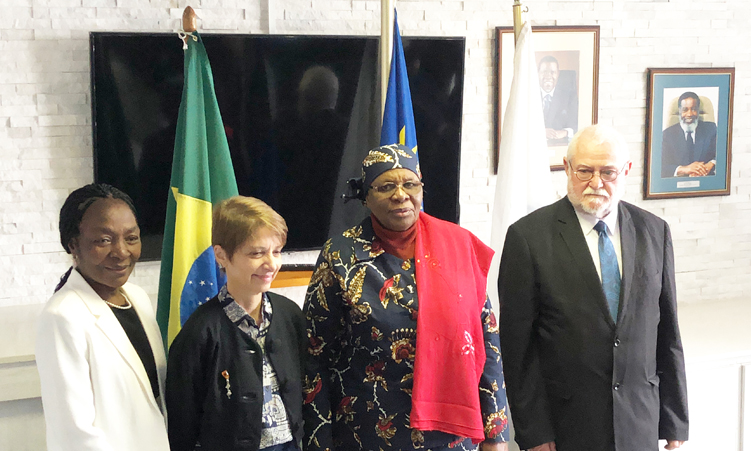Minister of agriculture, water and land reform Calle Schlettwein says Namibia is in a surplus position regarding beef and fish production.
“For basic staples, maize, we are moving close to full self-sufficiency, and local production currently stands at around 80% of total demand.
“Millet and wheat, however, are still far below the target and need to improve significantly,” he said at a donation handover ceremony in Windhoek yesterday, during which the Brazilian government donated US$120 000 (more than N$2 million) to the government.
“Several horticultural products have improved to above the 50% local production mark, and efforts are continuing to further increase production,” he said.
The donation is aimed at upscaling food system projects across the country and enhancing the production of food.
“The immediate impact of this donation would enable the beneficiary communities to be empowered to produce their own food, thus becoming less dependent on relief programmes.
“It would improve their nutritional intake and enhance the quality of lives and livelihoods, and encourage schooling and learning through cognitive skills development and human capital formation,” Schlettwein said.
The ambassador of Brazil to Namibia, Vivian Loss Sanmartin, during the handover said the Brazilian Cooperation Agency does not impose its view on beneficiaries.
“We regard cooperation as a win-win process, whereby we share with others our experience, techniques, and best practices, but we also learn from them in the process.
“We do not impose our views,” she said.
Sanmartin said Brazil appreciates the World Food Programme (WFP) for its invaluable support and technical assistance.
“Our cooperation is mainly aimed at training, capacity building, and the transfer of knowledge so that the communities involved are empowered and can subsequently replicate what they have learnt,” she said.
Sanmartin said for the past years the cooperation between Brazil and Namibia in the food security area has made significant strides.
“What began in 2019 as a humanitarian action in response to a request from the Namibian government, has evolved to a second donation of financial resources in 2020, used to fund five community-based food system projects, aimed at helping marginalised communities to fight hunger and malnutrition, improve their diets, build resilience against recurrent events such as droughts or floods, and promote local food value chains and job opportunities,” she said.
Minister of international relations and cooperation Netumbo Nandi-Ndaitwah said the government is looking forward to the efficient and purposeful use of the funds.
She said through this cooperation Namibia would benefit by moving from being a net importer of food to a net exporter.
“We are grateful for continuously learning from Brazil,” she said.
“Through agricultural production, our young people will be able to create the necessary jobs. We thank the government of Brazil and the World Food Programme, who are our reliable partners, for making sure food security is realised in Namibia,” Nandi-Ndaitwah said.
World Food Programme country director Ericah Shafudah says from December 2020, WFP Namibia has gradually moved its focus from procurement and distribution to piloting livelihood projects.
“In 2021, the WFP, in partnership with the Republic of Brazil, supported the implementation of five community-based food system projects at Tsumkwe Clinic in the Otjozondjupa region, Olukula Clinic in the Ohangwena region, Epako Clinic in the Omaheke region, Stampriet School in the Hardap region, and Opuwo Maternity Centre in the Kunene region.”
Shafudah says since their inception, the projects have impacted the community, including indigenous communities, people living with HIV-AIDS, tuberculosis patients, and schoolgoing children.



Leave a Reply